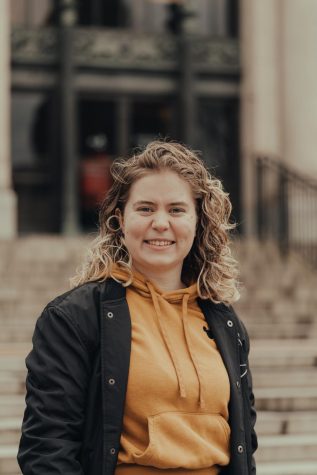Benton County to stay in ‘high risk’ category; COVID-19 cases rising
May 10, 2021
Clarification: We have updated information in this article provided by Marion Ceraso to give more clarification.
Positive COVID-19 cases are rising again in Benton County after declining for several months, but the county will stay in the ‘high risk’ category due to low seven-day average hospitalization increases.
On Friday, May 7, Benton County was expected to reenter the ‘extreme risk’ category of the COVID-19 framework due to its increasing positive COVID-19 cases. Benton County would have joined fifteen other counties—including Multnomah, Clackamas, Linn, and Lane—that reentered the extreme risk category due to their positive rising COVID-19 cases on Friday, April 30.
However, on Tuesday, May 4, Governor Kate Brown announced, “with the statewide seven-day average increases for hospitalized COVID-19 positive patients dropping below 15 percent, Oregon no longer meets the statewide metrics for the ‘extreme risk’ level.”
This means that the fifteen counties that had reentered the ‘extreme risk’ category on April 30 will move back to ‘high risk’ on Friday, May 7, and other counties with rising COVID-19 cases such as Benton County will stay in the ‘high risk’ category.
This is because, according to April Holland, Benton County public health administrator, the Oregon Health Authority recently changed its criteria so that no counties in Oregon move to ‘extreme risk’ level if there are less than 300 statewide COVID-19 hospitalizations or less than a 15% increase in the number of COVID-19 hospitalizations from the previous week. Current hospitalization numbers can be seen on the OHA website.
Brown’s announcement confirmed that Oregon had less than a 15% increase in the number of COVID-19 hospitalizations in the past seven days.
In her announcement, Brown said, “With our statewide hospitalization rate stabilizing, our hospitals should have the capacity to continue treating patients with severe cases of COVID-19 and other serious medical conditions in the coming weeks.”
However, while Brown says that her “expectation is that we will not return to ‘extreme risk’ again for the duration of this pandemic,” COVID-19 cases are still increasing in Benton County and throughout the state of Oregon.
There are several reasons why this increase in cases could be happening, including a new COVID-19 strain that is 50% more transmissible than the original virus, according to Holland.
“The variant B.1.1.7 (sometimes referred to as the “UK variant”) is increasingly detected with, and our level of vaccination is not yet sufficient to prevent this and other strains from sweeping across the state,” Holland said.
Additionally, with schools opening to in-person classes again but children under 16 being unable to receive the vaccine, more cases could be coming from this increase of in-person instruction. Already there is evidence that most of these positive cases are amongst the younger generations.
“Many people in vulnerable populations have already received their vaccinations, whereas many younger people have not yet been vaccinated,” Patrick Rollens, the public information officer for the City of Corvallis said via email. “The rising cases appear to be in this younger demographic, which includes university students.”
However, Adam Brady, an infectious disease specialist at Samaritan Health Services said that, for the most part, this does not include young kids below the age of 16.
“If you look at Benton County’s data, going week by week, the most cases are between ages of 18 through 29 and behind that is 30 through 49,” Brady said. “Between 0 and 17, there were only five this week and nine last week. So, it doesn’t seem like cases are spiraling out of control in the younger age group and schools are fueling this.”
According to Brady, data shows that schools are able to operate safely with certain rules and regulations in place and are not causing a dramatic increase in cases.
The rise in cases could also be because Oregon was never hit as hard by COVID-19 like many other states were, so there isn’t as much natural immunity built up from previous infection.
“This is certainly not to say that there should have been more infections,” Holland said. “As with cases come more hospitalizations and deaths, but we may find that Oregon may need to vaccinate at a higher rate to achieve widespread immunity.”
According to Holland, a high level of vaccination can help to slow transmission because vaccinated individuals will be less likely to be infected or pass along the virus if they encounter it. For this reason, Benton County is working to vaccinate its residents as quickly as possible.
“In fact, 55% of all Benton County residents have received at least one dose of the COVID-19 vaccine, and we are leading the state in the rate of vaccine administration,” Holland said. “Almost 40% of County residents have been fully immunized.”
Not only is Benton County leading the state of Oregon in how many vaccines have been administered but, according to Brady, a website called COVID Act Now also shows how Benton County is doing compared to the rest of the country.
Brady said the website even shows that the Corvallis metropolitan statistical area, which is basically Benton County, is ranked 17th in the country for vaccination areas.
Eventually, after enough people are vaccinated, herd immunity will be reached, meaning there are enough immune within the community that even those who don’t have immunity to COVID-19 will have a reduced chance of being exposed and thus being infected by the virus.
According to Marion Ceraso, associate professor in the School of Social and Behavioral Health Sciences at Oregon State University, this will slow the spread of the virus.
“Dr. Anthony Fauci, the director of the National Institute of Allergy and Infectious Diseases, suggests that we should stay focused on the goal of vaccinating as many people as possible,” Ceraso said via email.
Some community members may have concerns about the vaccine but Ceraso said that public health agencies and partners are listening to and addressing concerns to help encourage the community to receive their vaccines.
“They are sharing information about the safety and effectiveness of the vaccine, and making sure people know that getting the vaccine is the safest way to avoid getting COVID-19 and to protect your family, friends and fellow students,” Ceraso said. “Vaccination is one of the most important tools in our toolkit right now.”
Benton County has avoided entering the ‘extreme risk’ category this week and, with the increasing vaccination efforts, positive COVID-19 cases are expected to soon decrease again.
“Recent modeling shows that with strong adherence to guidance, this could be a short surge lasting just another few weeks,” Holland said. “Governor Brown’s goal of opening up by the end of June is still attainable if we can suppress the current surge and continue vaccination.”



















































































![Newspaper clipping from February 25, 1970 in the Daily Barometer showing an article written by Bob Allen, past Barometer Editor. This article was written to spotlight both the student body’s lack of participation with student government at the time in conjunction with their class representatives response. [It’s important to note ASOSU was not structured identically to today’s standards, likely having a president on behalf of each class work together as one entity as opposed to one president representing all classes.]](https://dailybaro.orangemedianetwork.com/wp-content/uploads/2025/03/Screenshot-2025-03-12-1.00.42-PM-e1741811160853.png)
























